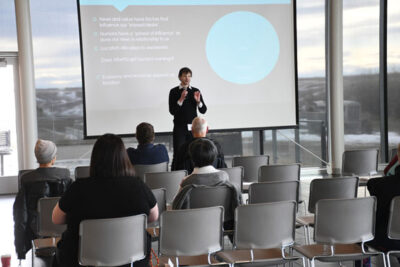Sifting the wheat from the chaff takes a keen journalistic eye
By Justin Seward on January 10, 2023.
 Herald photo by JUSTIN SEWARD
Journalist Ry Clarke spoke to an audience about news value at the Galt Museum on Sunday.
Herald photo by JUSTIN SEWARD
Journalist Ry Clarke spoke to an audience about news value at the Galt Museum on Sunday.Ever wonder why one story makes the front page, and another might end up below the fold on page 9?
Local journalist Ry Clarke spoke about News Value at the Galt Museum on Sunday afternoon, answering many of the questions that can often arise in the public’s mind about how decisions are made in newsrooms across the nation.
Clarke, a Local Journalism Initiative reporter with the Lethbridge Herald, was hoping to get across to listeners how information is taken in from a news value component.
“I was really hoping to have audiences be more aware of the who, the what, the where, the when, the why and the how,” said Clarke. “When it comes to our world, we have different locations and we have different places and how that all comes out into a news value component. So in speaking with audiences I kind of had it divided up into location, personal values, what we assess in our personal life and our work life, and how that plays out into our lives in the media.”
Clarke said generally if you have an answer for those questions, it has news value.
“So when it comes to it, it comes to the No. 1 person,” he said.
Clarke referred to the No.1 person as ‘who’, which means who is the person in the story and whether that is one person, a group or an entity.
‘What’ means what is that person doing? Followed by ‘when’ the event happens.
Clarke thought the most challenging part of being a journalist is the ‘why’ factor.
“The ‘why’ is sometimes the hardest part but it’s also the part that is the most influential,” said Clarke.
“And this is why it comes down to one of those issues I have, and that’s ethics. As a news journalist, when I hold control of the ‘why’, do you think I have to be very ethical of how I am presenting that? Hint, yes and here’s why: because I control the information. As a new journalist, it is my job to make sure you have the information to go with this news story. But it is also my job to make sure I’m presenting you the truth and that’s where we get little issues in news and journalism, is that you have people that take sides.”
Clarke told the audience that if you want to know if a journalist is telling you a good, honest news story, don’t look at the quotes but look at what they’re writing.
“If you see the words are good, if you see the words bad or any sort of synonyms that you can put in place of emotion, that’s wrong,” he said.
“They should not be doing that to you. I do not enjoy when I read a news story and it starts off with, ‘Well he was in a good mood because of this event’,” said Clarke. “Well, how did he (the journalist) know he was in a good mood? how do you know the person involved in the story is in a good mood without telling the audience in that way? Well simple. ‘Hey sir, how do you feel about this event and do you feel like you’re in a good mood afterwards?’ You ask them the right questions they’ll tell it to you, for you, and you don’t have to tell the audience that way.”
Clarke wanted to emphasize where we are in the world places a high value on what is being consumed for news.
“For instance, we know about the war in the Ukraine, but we don’t know about the personal details of that,” said Clarke.
“But also here in Lethbridge, we know the intimate details of our city council, we know who our politicians are. Whereas we don’t know that about another place across the world because those aren’t our politics, those don’t have value towards our way of daily life but they’re still important. So it’s just that understanding that news and the value has a place in our life depending on our circumstances.”
Clarke was asked by the audience about fake news.
“I was glad they brought that that up because it allows me to explore with the audience how that intangible fact of news can be manipulated when we’re not being presented the information correctly or we’re being presented the information with a hidden agenda,” said Clarke. “It can change, it can alter it and then that alters the value of the information we’re receiving.”
20-19




